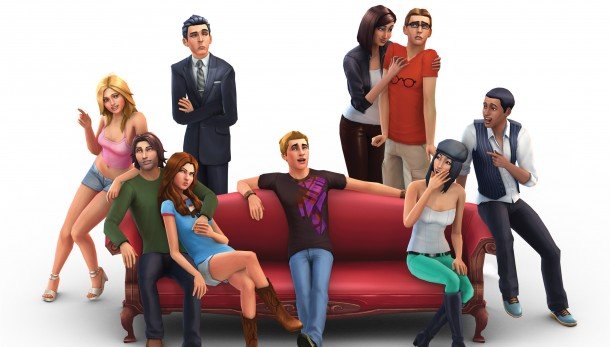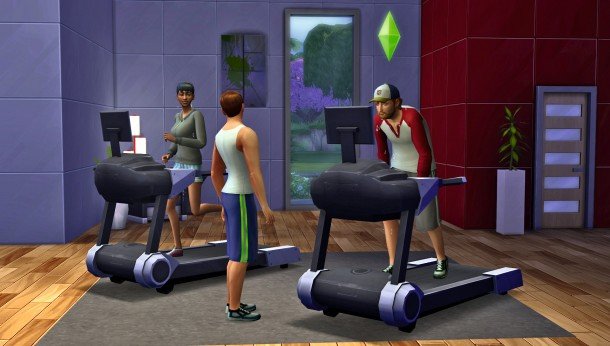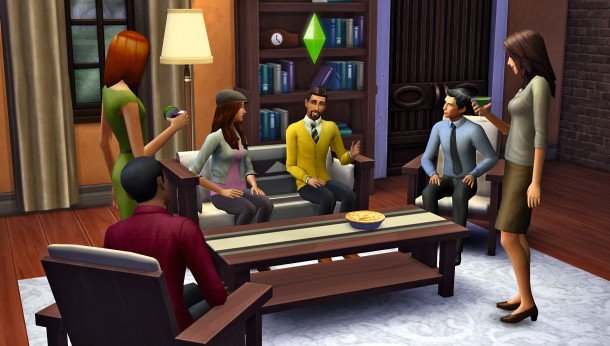The Sims 4 first look: getting emotional with Maxis' latest life sim

Emotions are a real pain, aren't they? Think of all of the amazing things we could achieve if we didn't feel anything other than the momentary satisfaction of having our needs met. I've been playing The Sims 3 lately, after a visit to Maxis to see the hyper-popular life simulator's upcoming sequel. In The Sims 3, tiny virtual me has no worries other than when he's going to eat and when he's going to sleep.
When the toilet breaks, he gets cross – but the satisfaction of fixing the toilet (something I never thought I'd particularly go for) is sufficient to send him bounding on his happy way. He doesn't slack off and go eat ice cream in the bath because he's feeling down. He isn't compelled to lay into a punch bag after a rough trip to the supermarket. He doesn't pass by a painting and find himself compelled to go create something of his own.
Instead, he's focused, lean and efficient. He's had three books published and works out in the afternoon. I sort of wish I was him.
In The Sims 4 , Maxis are bringing the full weight of emotion to bear on the shoulders of the game's tiny automata. An argument might leave a Sim feeling angry, while professional failure might lead to depression. A darkened room lit by flickering candles might spur your Sim into a 'romantic' state, an emotion I suggested several unpublishable names for during my visit.
“We really want to dive deep and focus on the Sims' emotional experience,” producer Ryan Vaughan says. “We feel like these Sims are more relatable and believable than ever and the content supports that.”

The emotion system replaces the binary happy and sad states of prior Sims with 14 feelings that impact that character's behaviour. An impressive new animation system enables everything from a Sim's facial expression to their walk to be impacted by mood, and it'll even change the sound of their voice and the kind of things they talk about to other Sims.
The new animations will shake things up for existing Sims players in other ways. Characters now move much more realistically, and in a series first a group of Sims can walk down a staircase one by one without looking like they're recreating the video for Daft Punk's Around The World. Furthermore, you can direct people to multitask – watching TV while eating, for example, or telling anecdotes around the dinner table – in ways that make micromanaging your Sim's individual needs less arbitrary. Fans of John Osborne will note that it is now possible to direct your Sims to have an argument while washing the dishes.
Keep up to date with the most important stories and the best deals, as picked by the PC Gamer team.
Maxis's take on what emotions mean in practical terms is interesting. The most obvious system to implement would be one where you always wanted your Sims to be happy, but that's not the case here: every emotion confers a benefit of some kind, even negative ones. If your character is enraged, you can direct them to work out on a treadmill more intensely. Not only will they burn off the anger, but the workout itself will be more effective.
This then feeds into the game's broader objective, which is to populate the world with engaging characters: because athleticism is a prerequisite for working in the space program, you'll probably want to ensure that your would-be astronaut is always angry at something. Angry Astronaut sounds like a pretty interesting guy.
“Depressed Sims make better writers,” quips executive producer Rachel Franklin during a presentation. There's an uneasy ripple of laughter around the table. I consider asking if Sims that feel pleased with themselves give better presentations, but don't.

“What's fun, when we see some of the emergence come through, is chaining together things unexpectedly that you don't plan for,” says producer Lindsay Pearson. “The fact that we have a walk overlay that's really sad ends up being really funny when you have them walking over to make coffee in the morning and they sit there and sigh and slump, and you're like: 'Yeah! I've had that!'”
Many of the benefits unlocked by emotions take the form of new interactions with objects in the environment. Sad Sims can paint an exclusive set of paintings, for example, and then Sims that pass those paintings on the wall will have some of that emotional weight transferred to them – a technique that could be called 'revenge', but is also another way of interacting with the time management game ticking away underneath every Sims session. I'm also told that Sims under the sway of 'romance' will unlock the power to woohoo in the shower. Again, it's not the word I'd have chosen.
You'll also have greater control over the memories that come to define a Sim's outlook on life. Unlike The Sims 3, where these sometimes felt arbitrary (“remember that time when I fixed the toilet? That was great!”) you'll assign emotional significance to events yourself. Reminiscing about these later is a way of carrying, say, the emotional high following a wedding into the years to come. That said, if you choose to make the associations more arbitrary, the game won't stop you. “If you wanted, you could say that your Sim remembers a particular shower and he's super ecstatic about it,” Pearson says. “That could be one of his moments.”
“It won't be a situation where objectives simply have an emotional [connotation],” Franklin continues. “You won't be thinking, 'Oh man, I really want that new stove – but it's the Sad Stove!' It's more selective than that.”
Nonetheless, the new system will make house planning more important and place greater emphasis on the things your Sims surrounds themselves with. I find the politics of The Sims fascinating – it is unquestioningly consumerist in its outlook – but the way the emotion system ties into home decor is a conceit to support strategy and simulation, not a way to transmit the message that you should spend a lot of money on an exciting shower.
Joining in 2011, Chris made his start with PC Gamer turning beautiful trees into magazines, first as a writer and later as deputy editor. Once PCG's reluctant MMO champion , his discovery of Dota 2 in 2012 led him to much darker, stranger places. In 2015, Chris became the editor of PC Gamer Pro, overseeing our online coverage of competitive gaming and esports. He left in 2017, and can be now found making games and recording the Crate & Crowbar podcast.


